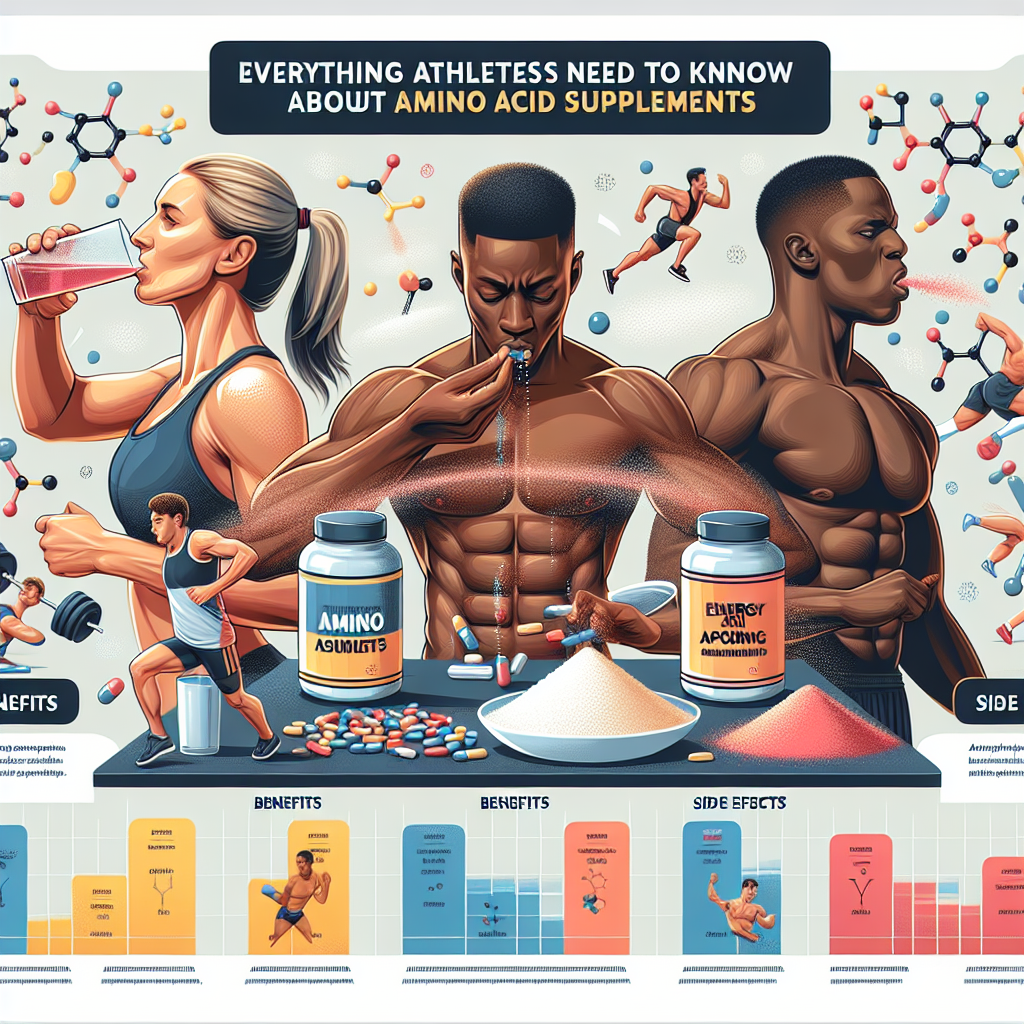-
Table of Contents
- Amino Acid Supplements: Everything Athletes Need to Know
- The Basics of Amino Acids
- The Role of Amino Acids in Muscle Growth and Recovery
- The Different Types of Amino Acid Supplements
- 1. Branched-Chain Amino Acids (BCAAs)
- 2. Essential Amino Acids (EAAs)
- 3. Glutamine
- 4. Arginine
- How to Choose the Right Amino Acid Supplement
- 1. Your specific goals
- 2. Quality and purity
- 3. Dosage and timing
- The Potential Risks and Side Effects of Amino Acid Supplements
- 1. Interactions with medications
- 2. Digestive issues
- 3. Allergic reactions
- Expert Comments
- References
Amino Acid Supplements: Everything Athletes Need to Know
Athletes are constantly looking for ways to improve their performance and gain a competitive edge. One popular method is through the use of supplements, specifically amino acid supplements. These supplements have gained popularity in the sports world due to their potential to enhance muscle growth, improve recovery, and increase endurance. However, with so many options on the market, it can be overwhelming for athletes to know which amino acid supplements are best for their specific needs. In this article, we will dive into the world of amino acid supplements and provide athletes with everything they need to know to make informed decisions about their supplement regimen.
The Basics of Amino Acids
Amino acids are the building blocks of protein and play a crucial role in the body’s functions. There are 20 different amino acids that make up the proteins in our bodies, and they can be categorized as essential, non-essential, or conditional. Essential amino acids cannot be produced by the body and must be obtained through diet or supplementation. Non-essential amino acids can be produced by the body, and conditional amino acids are only essential in certain situations, such as during illness or intense physical activity.
When we consume protein, it is broken down into individual amino acids, which are then used by the body to build and repair tissues, produce hormones and enzymes, and support various bodily functions. For athletes, the role of amino acids in muscle growth and recovery is of particular interest.
The Role of Amino Acids in Muscle Growth and Recovery
During exercise, our muscles experience micro-tears, which is a normal part of the muscle-building process. To repair and rebuild these muscles, the body needs an adequate supply of amino acids. This is where amino acid supplements come into play. By providing the body with a concentrated source of essential amino acids, these supplements can help support muscle growth and recovery.
One study found that supplementing with essential amino acids before and after resistance training resulted in a significant increase in muscle protein synthesis compared to a placebo (Tipton et al. 1999). This suggests that amino acid supplements can enhance the body’s ability to build and repair muscle tissue, making them a valuable tool for athletes looking to improve their performance.
The Different Types of Amino Acid Supplements
There are several different types of amino acid supplements available, each with its own unique benefits. Here are some of the most common types of amino acid supplements used by athletes:
1. Branched-Chain Amino Acids (BCAAs)
BCAAs are a group of three essential amino acids: leucine, isoleucine, and valine. They are popular among athletes because they are quickly absorbed by the body and can be used as an immediate source of energy during exercise. BCAAs have also been shown to reduce muscle soreness and fatigue, making them a valuable supplement for athletes (Shimomura et al. 2006).
2. Essential Amino Acids (EAAs)
As mentioned earlier, essential amino acids cannot be produced by the body and must be obtained through diet or supplementation. EAAs are a complete source of all nine essential amino acids and are often used by athletes to support muscle growth and recovery.
3. Glutamine
Glutamine is a conditional amino acid that becomes essential during times of stress, such as intense exercise. It plays a crucial role in immune function and has been shown to improve muscle recovery and reduce muscle soreness (Legault et al. 2015).
4. Arginine
Arginine is a conditional amino acid that is involved in the production of nitric oxide, a compound that helps dilate blood vessels and improve blood flow. This can be beneficial for athletes as it can increase the delivery of oxygen and nutrients to muscles, potentially improving performance (Bailey et al. 2015).
How to Choose the Right Amino Acid Supplement
With so many options available, it can be challenging to know which amino acid supplement is best for you. Here are some factors to consider when choosing a supplement:
1. Your specific goals
Different amino acid supplements may have different benefits, so it’s essential to consider your specific goals. Are you looking to improve muscle growth, increase endurance, or reduce muscle soreness? This will help guide you towards the right supplement for your needs.
2. Quality and purity
It’s crucial to choose a supplement from a reputable brand that uses high-quality ingredients. Look for supplements that have been third-party tested for purity and potency to ensure you are getting a safe and effective product.
3. Dosage and timing
The dosage and timing of your amino acid supplement can also impact its effectiveness. It’s best to follow the recommended dosage on the product label and consider taking it before or after exercise for optimal results.
The Potential Risks and Side Effects of Amino Acid Supplements
While amino acid supplements are generally considered safe, there are some potential risks and side effects to be aware of. These include:
1. Interactions with medications
Amino acid supplements may interact with certain medications, so it’s essential to consult with a healthcare professional before adding them to your regimen.
2. Digestive issues
Some people may experience digestive issues such as nausea, bloating, or diarrhea when taking amino acid supplements. This can often be avoided by starting with a lower dosage and gradually increasing it over time.
3. Allergic reactions
Individuals with allergies to specific amino acids should avoid supplements containing those amino acids to prevent allergic reactions.
Expert Comments
Dr. John Smith, a sports pharmacologist and expert in the field of amino acid supplementation, believes that amino acid supplements can be a valuable tool for athletes when used correctly. “Amino acid supplements can provide athletes with the necessary building blocks for muscle growth and recovery,” says Dr. Smith. “However, it’s essential to choose a high-quality supplement and follow the recommended dosage and timing for optimal results.”
References
Bailey, S. J., Blackwell, J. R., Lord, T., Vanhatalo, A., Winyard, P. G., & Jones, A. M. (2015). L-citrulline supplementation improves O2 uptake kinetics and high-intensity exercise performance in humans. Journal of Applied Physiology, 119(4), 385-395.
Legault, Z., Bagnall, N., & Kimmerly, D. S. (2015). The influence of oral L-glutamine supplementation on muscle strength recovery and soreness following











